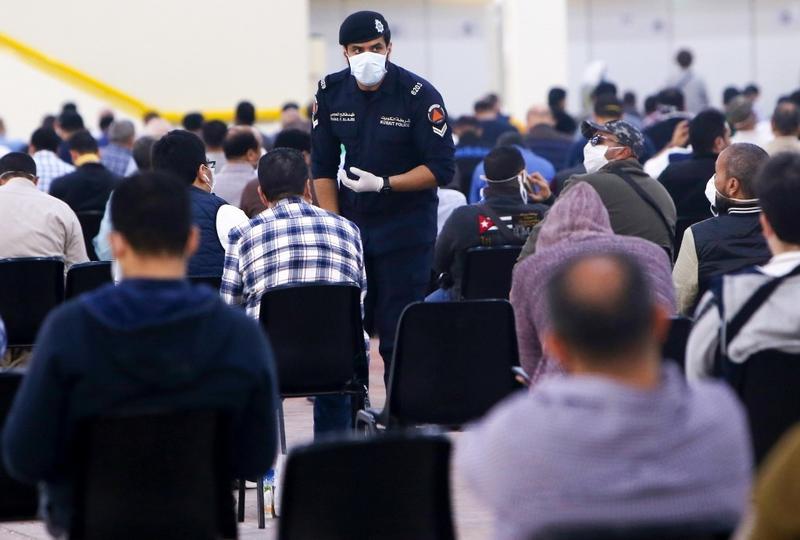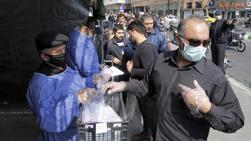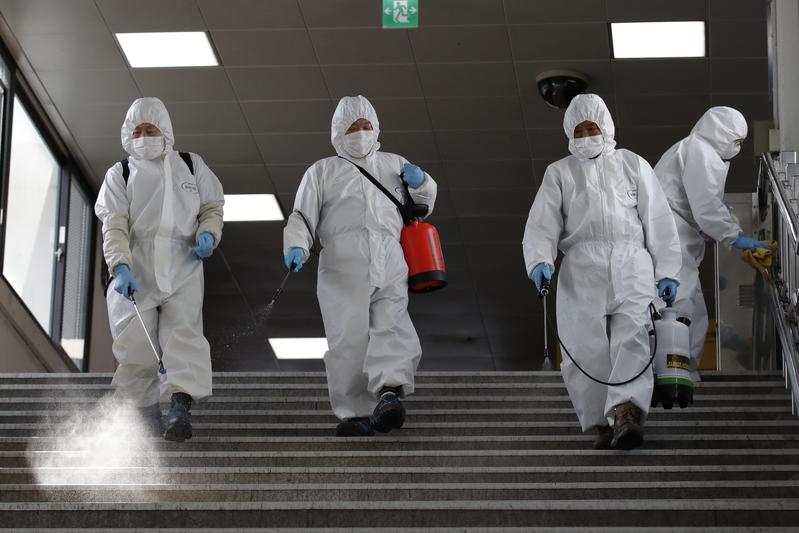
Expatriate returning from Egypt, Syria, and Lebanon arrive to be re-tested at a Kuwaiti health ministry containment and screening zone for COVID-19 coronavirus disease in Kuwait City on March 16, 2020. (YASSER AL-ZAYYAT / AFP)
TEHRAN / SEOUL / DOHA / BAGHDAD / AMMAN / BEIRUT / JERUSALEM / ISLAMABAD / MUMBAI / WELLINGTON / YANGON / CANBERRA / MANILA / ANKARA / RIYADH / DUBAI — Bahrain reported the Arab Gulf’s first death from the coronavirus on Monday and Saudi Arabia urged its citizens to stay at home as the region broadened measures to shield populations and economies from the outbreak.
Nearly 1,000 people have now tested positive for the virus in the six-nation Gulf Cooperation Council, and member states have restricted entry and movement
Nearly 1,000 people have now tested positive for the virus in the six-nation Gulf Cooperation Council, and member states have restricted entry and movement.
Saudi Arabia, which along with Kuwait suspended all international flights and closed most public spaces, said it was considering suspending work for the private sector after doing so for the government sector, except health and security.
“We hope citizens will stay at home and not go out unless needed,” Saudi Health Minister Tawfiq Al Rabiah told a news conference on Monday.
The kingdom ordered the private sector to give two-week mandatory sick leave for pregnant women and employees with conditions that leave them vulnerable, state media reported.
The 65-year-old Bahraini woman who died from the coronavirus had underlying health conditions, Bahrain’s health ministry said on Twitter. Bahrain has reported 221 cases, including dozens among citizens evacuated from Iran last week.
Bahrain state media on Sunday showed footage of a quarantine center set up on a barren island connected to the mainland by a causeway. Dozens of beds ready for patients lined large marquees with air conditioning units, cupboards and colorful carpets.
Across the Gulf, patriotic Twitter hashtags and social media images circulated with the phrase “We are all at home for the sake of ...” using the relevant Gulf country and its national flag.
In the United Arab Emirates, the government issued a tweet reassuring people about supplies of goods after a rush on supermarkets.
Gulf Arab states have announced stimulus packages and incentives for the private sector to mitigate the impact on their economies from the outbreak, which has disrupted global travel and led to lockdowns in many countries.
The central banks of Qatar, Saudi Arabia, the UAE, Bahrain and Kuwait cut benchmark interest rates on Monday, a day after the US Federal Reserve slashed its rates to near zero.
Dubai
Dubai, the region’s tourism and business hub, ordered bars and lounges to close until the end of March, according to a government circular issued on Monday, and advised people not to hold parties and weddings at home.
A day earlier, Dubai joined Abu Dhabi in closing gyms, public gardens, arcades and spas. Bourses in both emirates shut trading halls.
While restaurants remain open in the UAE, other Gulf states are now only permitting food delivery. Qatar on Monday banned people from eating at restaurants and cafes, state media said, joining Kuwait and Saudi Arabia in doing so.
Oman on Monday suspended Friday prayers held weekly by Muslims and canceled all non-urgent surgery in hospitals.
Many of the 983 coronavirus cases in the Gulf are linked to travel with Iran, which has recorded 853 deaths and 14,991 infections. Iranian President Hassan Rouhani issued a new appeal on Monday for people to avoid unnecessary trips.
Shrines and mosques in the Islamic Republic have been closed and clerics have urged people to pray remotely and avoid visiting Shi’ite Muslim holy sites.
State television showed chain supermarkets in Tehran with fully stocked shelves. But hand sanitizer and face masks are in short supply, according to Iranians on social media.
 People queue in line to receive packages for precautions against COVID-19 coronavirus disease from a booth outside Meydane Valiasr metro station in the capital Tehran on March 15, 2020. (STRINGER / AFP)
People queue in line to receive packages for precautions against COVID-19 coronavirus disease from a booth outside Meydane Valiasr metro station in the capital Tehran on March 15, 2020. (STRINGER / AFP)
Iran
Iran's Ministry of Health and Medical Education said that over 10 million Iranians have been screened for COVID-19 symptoms, Press TV reported on Monday.
Deputy health minister Alireza Raeisi said Sunday that the screening had been carried out over past four days.
The second round of Iran's parliament elections will be held on Sept 11, Abbasali Kadkhodaei, the spokesman for the Guardian Council of Constitution announced on Sunday.
Iran's Ministry of Health and Medical Education announced Sunday that novel coronavirus has affected 13,938 people of whom 724 people have died
The council agreed with the request of the Iranian Ministry of Internal Affairs to postpone the second round of elections over the spread of novel coronavirus, Kadkhodaei was quoted as saying by official IRNA news agency.
ALSO READ: Iran says voter turnout in parliamentary election 42.57%
"The second round of parliamentary elections was to be held on April 17, but it was canceled," he said.
Iran's Ministry of Health and Medical Education announced Sunday that novel coronavirus has affected 13,938 people of whom 724 people have died.
Iran declared the first cases of infection with the COVID-19 in the central city of Qom on Feb 19.
Iraq
Iraq's Health Ministry on Sunday confirmed 14 new cases of COVID-19, bringing the total number of the infected in the country to 124.
Of the 124 confirmed cases, nine have died from the disease, while 26 others have recovered, the ministry said in a statement.
Meanwhile, the Iraqi Crisis Committee, headed by Iraqi Health Minister Jaafar Sadiq Allawi, decided to impose a week-long curfew in the capital city of Baghdad, starting from March 17 to 23, according to a statement issued by the committee.
It also decided to suspend the work of the governmental and non-governmental institutions, except for the security, service, and health institutions and diplomats, as well as authorized media and the commercial movement of goods and food.
To help Iraq cope with the coronavirus spread, a Chinese team of seven experts arrived in Baghdad on March 7. They are working with Iraqi counterparts in the fight against the viral respiratory disease, which has largely been taken under control in China after a nationwide campaign launched since late January.
Qatar
A total of 64 new cases of COVID-19 were registered in Qatar on Sunday, the Qatari health ministry said.
"The new confirmed cases thus raise the total number of infections to 401 all over the country," the Qatar News Agency quoted the ministry as saying.
The infected cases are being quarantined, receiving full medical care and in a very good health, the state-run news agency said.
Emir of Qatar Sheikh Tamim bin Hamad Al Thani announced earlier on Sunday additional measures to control the COVID-19 outbreak.
 Workers wearing protective gears disinfect as a precaution against the new coronavirus at the subway station in Seoul, South Korea, March 13, 2020. (LEE JIN-MAN / AP)
Workers wearing protective gears disinfect as a precaution against the new coronavirus at the subway station in Seoul, South Korea, March 13, 2020. (LEE JIN-MAN / AP)
South Korea
South Korea’s President Moon Jae-in said on Monday he was increasingly confident the country would overcome the coronavirus as the rate of new infections continued to drop, although authorities noted another large cluster had emerged in the greater Seoul area.
There were 74 new coronavirus infections reported on Monday, down from 76 on Sunday and marking the second day in a row that the number has been below 100. That is well below a Feb 29 peak of 909.
South Korea has 8,236 confirmed infections while 75 people have died, according to the Korea Centers for Disease Control and Prevention (KCDC).
Unless there are unexpected developments, we expect this trend will also gain momentum
Moon Jae-in, President, South Korea
“Unless there are unexpected developments, we expect this trend will also gain momentum,” Moon said during a meeting with health officials at Seoul city hall. “Our confidence that we can overcome COVID-19 is growing.”
Both Moon and other officials warned against complacency - their remarks coming on the same day that central bank, in a bid to soften the economic impact of the virus, cut its benchmark interest rate by 50 basis points in an emergency meeting, taking it below 1 percent for the first time in history.
On Sunday, South Korea classified the worst-hit provinces as “special disaster zones”, allowing the government to subsidise up to half of restoration expenses and exempt residents from taxes and utility payments.
 Passengers wearing protective masks clean their seats at the Cubao bus terminal in Manila, Philippines Friday, March 13, 2020. (AARON FAVILA / AP)
Passengers wearing protective masks clean their seats at the Cubao bus terminal in Manila, Philippines Friday, March 13, 2020. (AARON FAVILA / AP)
The Philippines
Philippine President Rodrigo Duterte on Monday said the country’s main island of Luzon would be under home quarantine until April 12 to fight coronavirus, and told the public to heed the orders of police and soldiers, or be arrested.
In a televised recording of a meeting of top officials, Duterte said the “enhanced quarantine” measures were necessary to contain an unavoidable spread of the virus, including forcing companies to have employees work from home.
Duterte said existing restrictions were insufficient so the movement of people needed to be significantly limited on Luzon, home to more than half of the country’s 107 million people. He said he had been assured there were no issues with food supplies and stressed that the country was not under martial law.
New Zealand
New Zealand banned gatherings of 500 people or more on Monday to prevent the spread of the coronavirus and Prime Minister Jacinda Ardern warned of tough action against anyone who violates new self-isolation rules for people arriving in the country.
New Zealand has had eight cases of the coronavirus and no deaths.
Ardern announced on Saturday that everyone entering the country must isolate themselves for 14 days.
Ardern also warned that the economic impact of the coronavirus could be “greater than the global financial crisis” but promised that a proposed fiscal package would help ease some of the burden on businesses and individuals.
New Zealand’s central bank slashed interest rates by 75 basis points to a record low on Monday following an emergency meeting, as it prepared for a hit to the economy from the coronavirus.
The first phase of the business continuity package is to be announced on Tuesday.
“At this point, we cannot be sure of the impact but we can be sure it will be significant,” Ardern said, referring to the effect of the outbreak on New Zealand’s economy.

New Zealand Prime Minister Jacinda Ardern speaks during a press conference in Christchurch on March 13, 2020. ( VIDANAGAMA / AFP)
Japan
Japan's health ministry and local governments said Monday the number of COVID-19 infections stood at 804 in Japan as of 10:30 am local time.
The cases from the virus-hit Diamond Princess cruise ship were calculated separately.
The death toll in Japan from the pneumonia-causing virus currently stands at 31, according to the health ministry, with the figure including those from Diamond Princess that was quarantined in Yokohama, close to Tokyo.
Of the 804 confirmed COVID-19 cases in Japan, the majority are in Japan's northernmost prefecture of Hokkaido, which has confirmed 148 cases and previously declared a state of emergency over the situation.
Turkey
Turkey identified 12 new cases of the coronavirus, bringing its total to 18, Health Minister Fahrettin Koca said on Monday, marking the highest daily rise since the country announced its first case last week.
Koca said two of the new cases were related to the first case reported in the country, seven had traveled from Europe and three from the United States.
Turkey suspended mass prayers in mosques until the risk of coronavirus outbreak passes, the head of Turkey’s religious directorate, Ali Erbas said on Monday.
Speaking to reporters, Erbas said the mosques will be kept open for individual prayers.
Last Wednesday, Turkey became the last major economy to report an outbreak after taking what the World Health Organization (WHO) described as “vigilant” measures to delay it.
Since then, the government has ramped up measures to halt the spread of the virus, closing schools and universities, holding sports events without spectators and halting flights to many countries.
Jordan
Jordan on Sunday reported 10 new cases of novel coronavirus, bringing the total number of confirmed cases to 11.
Jordan suspended all schools and universities as of Sunday for two weeks as part of efforts to fight coronavirus.
All flights to and from Jordan will be suspended as of March 17 until further notice.
Lebanon
Lebanon's Prime Minister Hassan Diab Sunday called for general mobilization until March 29 amid the outbreak of COVID-19, Al Jadeed local TV channel reported.
The prime minister said that Lebanon has succeeded so far in slowing the spread of the virus with the exceptional measures adopted by the government.
The number of COVID-19 infections in Lebanon reached 99 on Sunday while the virus claimed the lives of three people so far.
READ MORE: Thailand reports biggest daily jump of 32 new cases
Israel
A total of 37 Israelis tested positive for COVID-19 on Monday, bringing the total number of confirmed cases in the country to 250, according to the Israeli Ministry of Health.
Of the 202 patients being treated in 21 hospitals across Israel, four are in serious condition, 11 in moderate condition and 187 in mild condition.
Of the remaining 48 cases, 44 are treated under home quarantine and the remaining four have recovered.
Pakistan
Pakistan's tally of COVID-19 patients rises to 94 with 42 new cases already reported in south Sindh province on Monday, the provincial health ministry confirmed.
Most of the new cases are the pilgrims who recently returned from Iran and were quarantined in Sindh where they were tested positive of the disease. With the emergence of the new cases, the total number of the disease-infected people in the province has risen to 76, the health ministry said in a tweet.
Pakistan has recently revised its strategy to control the spread of the disease by taking more stringent measures, after a meeting of the National Security Committee. The new measures include ban on all kinds of social, political, entertainment, and unnecessary religious gatherings and closure of educational institutes.
India
Various film and cinema associations in India have decided to put on hold shootings of various films, web series and TV shows during March 19-31 to contain the spread of COVID-19, according to a joint statement.
So far, India had two deaths from COVID-19 and confirmed cases under treatment rose to 107, including 17 foreigners.
Myanmar
Myanmar government issued a new statement regarding precautionary measures for travellers visiting Myanmar to contain the spread of COVID-19 late Sunday.
The statement included banning travellers who had been in high-risk areas in the past 14 days and also Myanmar nationals who had been in those areas will be placed in facility quarantine for 14 days on arrival.
Myanmar government claimed it has no cases of the disease so far till March 15 in the country.
Australia
The number of confirmed cases of COVID-19 in Australia increased almost 20 percent in a single day, from 249 on Sunday to 298 Monday morning.
According to the Department of Health, there were 298 diagnosed cases of the virus as of 1 pm Australian Eastern Daylight Time (AEDT) on Monday, up from 249 on Sunday morning.
The number of deaths has grown from three to five after two elderly people in New South Wales (NSW) died over the weekend.
The governments of Victoria, South Australia, Western Australia and the Australian Capital Territory have all declared the virus a public health emergency, giving them additional powers to prevent its spread.
The latest data was released as Prime Minister Scott Morrison prepares to announce a second economic stimulus package.
Having already announced a 17.6 billion Australian dollar (US$10.8 billion) package to prevent job losses, Morrison was meeting with Treasurer Josh Frydenberg and Finance Minister Mathias Cormann to discuss additional measures.
Indonesia
Indonesian President Joko Widodo said on Monday the authorities were not now considering imposing a lockdown to tackle the coronavirus outbreak, as the leader, his wife and a number of ministers awaited the results of tests for the virus.
The world’s fourth most populous country has reported a spike in cases with the number of confirmed infections hitting 134, while five people have died.
Jakarta and several other provinces and cities have already announced school closures starting this week, and civil servants and some companies are asking staff to work from home.


